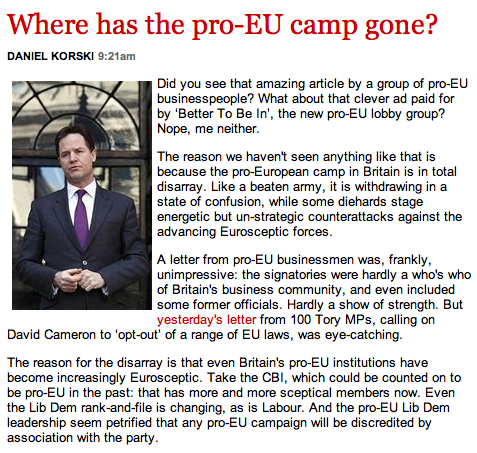 Daniel Korski has written a short piece at Spectator Coffee House entitled Where has the pro-EU camp gone? It’s a valid question to ask, if you view UK politics along the traditional lines of pro-EU versus anti-EU. The problem is that very frame only gets you so far.
Daniel Korski has written a short piece at Spectator Coffee House entitled Where has the pro-EU camp gone? It’s a valid question to ask, if you view UK politics along the traditional lines of pro-EU versus anti-EU. The problem is that very frame only gets you so far.
Korski rightly cites hardening attitudes to the EU in Labour. But equally how could any Labour person in their right mind support the Common Agricultural Policy or the agreement to ‘solve’ the Eurozone crisis through the fiscal pact that basically lumps the Eurozone countries with a commitment to austerity for a decade? So while the EU (and the UK’s membership of it) may be of enduring value, who spends their days arguing in favour of something that’s also getting things wrong?
The danger of course is that if Britain edges towards leaving the EU and a referendum were to be held, could those wanting Britain to remain in muster enough support and organisational competence at that time? That must be a worry. But for the moment, while Britain remains in, it’s much more worthwhile to argue about the direction the EU should go (more socially responsible, more free market, more decentralised – take your pick) than it is to simply man the barricades for its defence.








When the likes of Daniel Korski ask where the pro-EU camp has gone, I tend to say “writing comment pieces for the Spectator”.
If I were pro-EU, I’d be doing anything I could to avoid the discussion, as I argued in response to Daniel’s piece.
Questions I’d want to avoid answering, but would have to answer if I were seriously trying to defend the EU, would include:
how much democracy, freedom, rule of law and prosperity is it worth sacrificing for European integration?
is actual democratic consent to EU-wide governance ever likely to be obtainable?
is the Single Market, in its current form, or any form it is likely to assume in the future, actually beneficial for every single member state?
what is the benefit of restricting the economic policy options such that countries may follow the policies of Ludwig Erhard, Joe Chamberlain or Leo XIII, but not those of Ed Balls, Margaret Thatcher, Eamon de Valera or Paul Keating?
might the acquis communautaire gradually turn the whole Single Market into a larger version of Italy and hand vetos on fixing this to every established sectional interest group? Might this have already happened?
does the EU’s policymaking over intellectual property lead to a socially optimal outcome, or rent-seeking by established concentrated producer interests? Is there quantitative theoretical and empirical research which allows us to reach such a conclusion? Are there reasonable grounds for thinking this might be a general problem with Single Market rulemaking, not specific to intellectual property and copyright term extension?
what are the costs and benefits of Single Market legislative rulemaking, individually or collectively? Is it even necessary or beneficial to have standardisation of rules as well as free trade within the EU (as opposed to politically necessary for participation by certain member states such as France)? Are the arguments in favour of the Single Market coherent when considered in the light of the development of (much younger) WTO system?
how much moral concern should we have for the impact of EU protectionism on agricultural producers in Africa?
is the institutional setup of the EU part of the problem observed with policy outcomes?
to what extent has the EU been captured by concetrated producer interests? Has this had any impact on the EU’s institutional setup?
to what extent does the ECJ actually follow EU laws and treaties? To what extent has it been captured? Does it bemuse you that it almost never admits the EU lacks competence vis-a-vis the member states? Does the EU have dignified and efficient elements to its constitution (to use Bagehot’s terminology)? Is the efficient constitution of the EU actually one with no competence constraints whatsoever on EU legislation? To what extent would such a state of affairs be desirable, and democratically legitimate?
are the problems of the EU actually logically inseparable from an attempt to govern without democratic consent? Is there any theoretical or empirical evidence that government without consent is sustainable with (in historical terms) an educated and affluent population? Does the situation allow for much greater corporate rentseeking than real democracy? Is there some account of human society in which this is regarded as a good thing?
does the refusal of Europhiles to engage with the issues and admit that they might have been terribly wrong help prolong the current state of affairs?
The “fiscal compact” treaty is not a “commitment to austerity”: it sets no limits whatsoever to public expenditure, only to deficits. You can spend as much as you like as long as you finance it through taxes rather than excessive borrowing.
On deficits, the limit is on the “structural deficit” i.e; over the whole economic cycle. You can go over the limit in a dip as long as you go under during the peak. There is also an exceptional circumstances clause.
In other words Keynesian policies can be followed
it in the balanced way Keynes intended, without accumulating high levels of debt over time. There is nothing virtuous about high levels of debt — they mean that more and more of your tax revenues are wasted on servicing the debt instead of on public services and investment. That is the worst kind of austerity: high taxes simply to pay past debts!